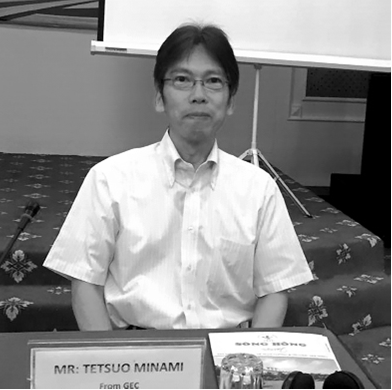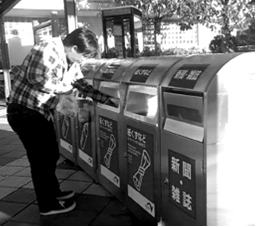

16/08/2017
 |
|
Mr. Tetsuo Minami - Director of International Cooperation Department - Global Environment Centre (GEC) |
Recently, the integrated waste management (IWM) is considered a new direction for waste management in many countries. In particular, Japan is the leader country in the treatment of waste and environmental protection. Things that Japan has been doing in waste treatment would be lessons for Việt Nam. To acknowledge this issue better, Environment Magazine had an interview with the Director of the International Cooperation Department - Global Environment Centre (GEC) Tetsuo Minami.
It is said that for the purpose of IWM to process effectively, we must treat waste as a resource whichhas an important role in the economic development. What are your comments about this problem?
Mr. Tetsuo Minami: I totally agree with the comments above. When natural resources are being depleted, the waste is considered a precious resource that people can recycle and reuse. In the world, some countries have succeeded in utilizing waste as renewable resources, with modern closed process for usage orientation, collection, sorting, recycling and production of environmentally-friendly products, in particular, can be exported to other countries.
In fact, waste is a rich resource, which if being properly exploited will contribute to environmental protection and greater economic benefits than new production. For example, the production of 1 ton of pulp requires 100 m3 of water; however, recycling 1 ton of recycled paper can save 32 m3 of water, 4200 kWh of electrical energy (which can be used by a family of 4 people in a year). Moreover, paper recycling not only takes advantage of available resources and minimizes environmental pollution but also saves energy. In addition, for green materials such as glass, it can be recycled many times without lowering quality. Glass recycling helps to reduce air pollution by 20% and 50% of water pollution.
What do you think about IWM? What helped Japan to successfully apply this method?
Mr. Tetsuo Minami: IWM allows aggregated consideration of aspects related to waste management such as natural environment, society, economy and institutions, with the participation of the stakeholders on the components of the quality management system waste (minimization, collection, reuse, recycling, landfilling). This approach is an integrated solution, ensuring sustainability in choosing planning and environmental management in specific conditions.
In IWM, prevention is the leading principle, which helps to prevent emissions or avoids creating waste. When emissions are reduced to the level equal to 0, it is the absolute prevention, which is an effective way to reduce emissions directly from the source. In the process of production and consumption, reducing emissions will reduce the costs for the next stages of waste treatment (reuse, recycling, recovery and landfilling...).
Japanese people use many kinds of goods and all of those will become waste after usage. Without recycling goods promptly, we will be run out of resources and energy, and habitat will be severely affected. Being aware of this, the Japanese people always attach importance to environmental protection, especially waste disposal problems. The Japanese Government has issued the Law on Promotion of using recycled resources in 1992 and the Law on Promotion of the collection, sorting and recycling of packaging in 1997. Thereby, the efficiency of use of the recycled products was improved by clearly defining the responsibilities of the stakeholders.
The success of the IWM in Japan originates from the result of 3 organic sticking factors. First is the involvement of the community, expressed by identifying problems, measurement and solutions for specific environmental problems caused by waste. Therefore, the ownership and responsibility of the community in environmental protection were increased to ensure their people’s right to live in a Green - Clean - Beautiful environment, while enjoying the benefits brought by the environment. In order to achieve this, the Japanese Government has been lobbying, advocating and enforcing people for waste separation at the source.
Also, we can not fail to mention the investment of the government and society into recycling facilities. Thus, the economic and social development with the awareness of the community, the investment in infrastructure for processing and recycling has an important role.
 |
|
Waste sorting has become a habit of Japanese people |
According to you, are those solutions feasible to be applied in Việt Nam?
Mr.Tetsuo Minami: Việt Nam is developing towards industrializing and modernizing. This is also the main cause of the growing in waste generation. However, Việt Nam can learn from Japan and other advanced countries in IWM, especially about the issues related to legislation, institutions, resources, actual state of solid waste, solid waste treatment technologies of local areas, as well as methods of data collection for orientating the appropriate solid waste treatment method in the future.
Japan has always been interested in electronic wastes and considered it as an income for the country. For many people it's just garbage but Japanese people consider it to be a gold mine. This kind of waste could be the mobile phone, television, computers, digital music players..., generally old electronic devices which were discarded. We can "dig" for gold, silver, copper and other metals inside the device. This type of recycling is called "urban mining", disassembling old electronic devices in order to recover valuable metals such as iridium and gold... This industry is currently "cash in" in Japan, especially in the context of the prices of various types of metal continually break records.
Việt Nam is on the path of sustainable development, Vietnamese are hardworking in research, learning; thus, if considering the feasibility, market demand, the interests of stakeholders and the actual conditions of each locality, I believe that Việt Nam can apply IWM with efficiency.
Thank you!
Mai Hương (Implemented)